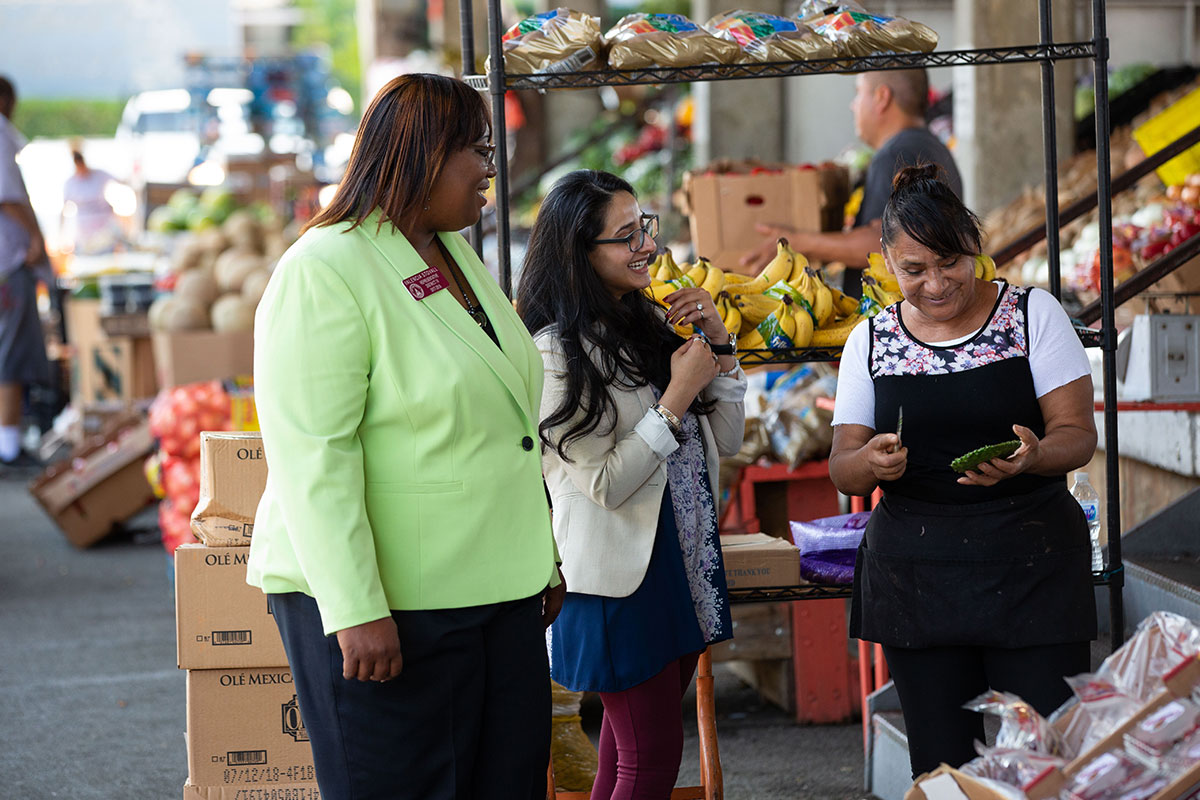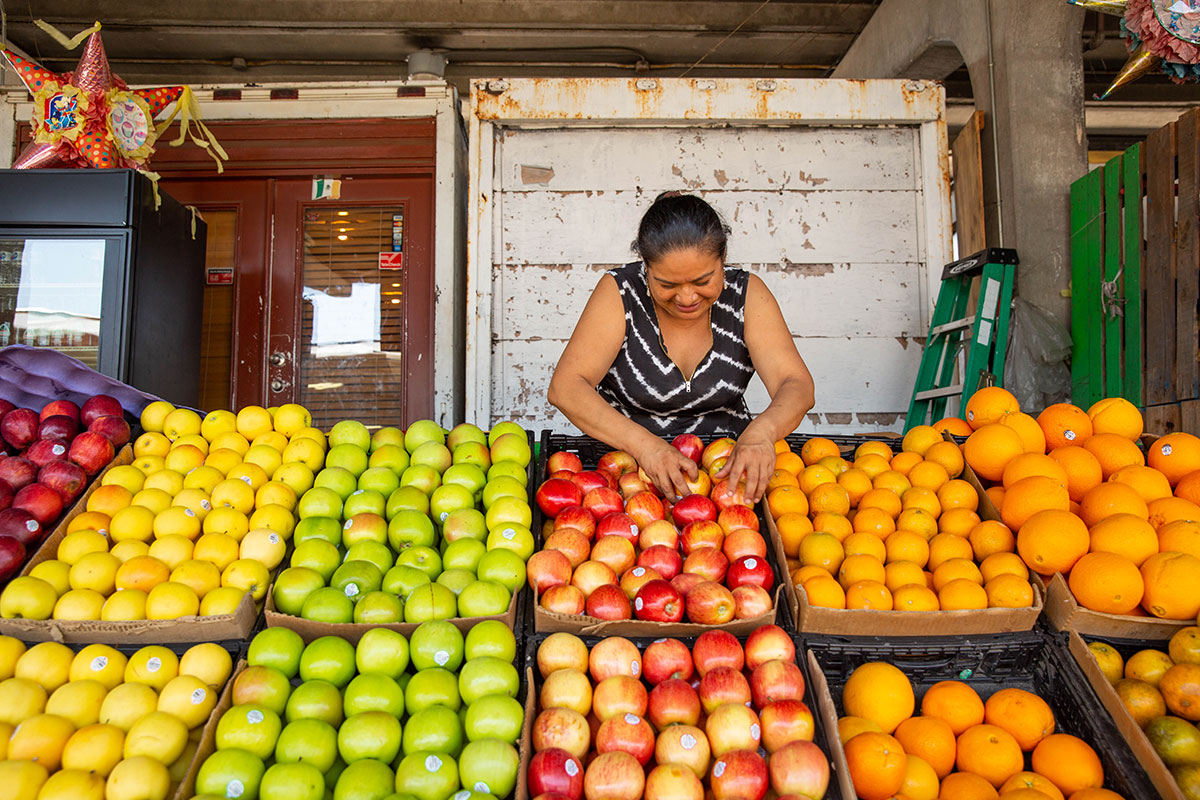
Share the Story on FacebookShare the Story on TwitterShare the Story via EmailShare the Story on LinkedIn
|
Atlanta State Farmer's Market Redevelopment Plan Gets Boost From Clayton State MBA Students
At 150 acres, the Atlanta State Farmers Market is the largest of the nine farmers markets across Georgia managed by the state’s agriculture department. Located in Forest Park, Georgia, the market is a 24-hour operation where trucks from all across the Southeast file in to distribute produce and goods to consumers and to wholesalers that serve restaurants, grocery stores, and other food-related businesses.
While it is one of the largest generators of revenue for the state of Georgia, over the years, the Atlanta State Farmers Market has seen a decline in its appearance and use beyond being a major distribution hub for the state’s agriculture industry.
But thanks to a local state house representative and a group of Clayton State University MBA students, the market looks to receive a second chance at life to become a burgeoning tourism destination and vibrant community gathering place for Clayton County.
Since moving to Clayton County in 2006, Atlanta native state Rep. Valencia Stovall (D-74) has seen the potential of the State Farmers Market as an economic driver for the community and the state.
Known by many locals as the site of the annual bird shows and gun shows in Atlanta, Rep. Stovall believes it’s time for the farmer’s market to emerge as a multi-faceted place for community events and agritourism for those interested in knowing where their food comes from.
“Tourism is the largest amount of revenue that comes to the state of Georgia,” says Rep. Stovall. “We want to make this one of the agritourism stops that we have throughout the state.”
A year ago, Rep. Stovall enlisted the help of Clayton State University’s MBA program to conduct a market analysis of the farmer’s market to determine the feasibility of the redevelopment of the market.
“The students were supposed to research the history of the State Farmers Market and analyze the external environment,” says Dr. George Nakos, professor of marketing. “They gathered information on the historical development of large state farmers market and the transformation of the industry in recent years. Then they offered practical recommendations on how the State Farmers Market could transform itself and grow in the future.”
The marketing students broke off into about six groups to evaluate the physical market space, aesthetics, brand awareness, and marketing of the farmers market.
“When we first got the breakdown of the project, we didn’t even really know where the state market was. So, the first step was to GPS it,” says Marria Malik, an MBA student who worked on the project.
Marria says her team chose to visit the market at different times by themselves or with families and friends to get a feel for how different demographics experience the market.
The classmates discovered raw space currently not used that was viable for development. They also found that the market was situated in a large, ethnically diverse community, which could be a selling point for the market.
“It’s so close to the city but removed enough to still be quiet,” Marria says. “If we were able to brand it correctly, I think it would be reflective of all Clayton County has to offer.”
Results from the analysis suggested that structural improvements at the farmer’s market are necessary to improve the aesthetic appeal of the market. The students also found that the market could diversify its vendor pool to attract a greater number of consumers, as well as focus on a direct-to-consumer approach to selling produce.
Clayton County Tourism By the Numbers
Total economic impact: $1.442 billion
Tourism jobs: 34,540
Local sales tax generated: $43.63 million
State sales tax generated: $173.19 million
Additionally, the students recommended that the farmer’s market focus on a programming strategy built around “fun” by increasing regular attendance during weekday lunch hours, as well as offering food truck featured days, cooking demos with Atlanta chefs, and visual art exhibits for those seeking early evening and weekend activities.
Increased advertising that brings awareness to the farmers market and promotes the “Georgia Grown” brand supported by local producers could attract a younger demographic and increase potential customers to the market, according to the analysis.
“There’s so much potential, but, right now, they are catering to the wholesale market,” Marria explains. “But If we are selling to [consumers] we can keep them here. Creating a destination versus a pit stop makes sense.”
The potential to shift the Atlanta State Farmers Market from a mere distribution hub to a social gathering and agricultural education locale is entirely possible. The success of the food hall concept pushed by Ponce City Market and Krog Street Market in downtown Atlanta demonstrates the growth in foodie culture in the city and the need for chefs to access fresh produce for their restaurants.
The Georgia Department of Economic Development’s tourism division recognizes Georgia as a leading culinary destination in the South thanks to a plethora of farm-to-table dining options, food festivals, cooking schools, u-pick farms, and award-winning chefs.
“With the market’s close proximity to Hartsfield Jackson International Airport and its convenient location to interstates I-75 an I-285, it is a great stop for visitors wanting to get those unique Georgia Grown products like Vidalia onions and sweet Georgia peaches,” says Beth Bailey, director of sales and promotion at the Clayton County Convention Visitors Bureau. “What is most exciting is the plan for special events and programs that will extend the stay of our visitors and add to their experience in Clayton County.”
And with the state’s agriculture industry generating $73 billion annually to Georgia’s economy, the redevelopment of the Atlanta State Farmers Market can build upon the state’s position as an agricultural powerhouse in the Southeast.
“Redevelopment of the State Farmers Market could create additional employment and business opportunities that would create a positive benefit for the city of Forest Park, agribusiness in the state of Georgia and would serve as a major destination for locals and tourist,” said Angela Redding, city manager for Forest Park.
Rep. Stovall and her colleagues managed to get a house resolution passed in the Georgia General Assembly in the spring 2018 legislative session to form a study committee for revitalizing the farmers market.
“We are pleased that Representative Stovall recognizes the potential job and economic opportunities that the Atlanta Market provides and appreciate her input and enthusiasm,” says Georgia Agriculture Commissioner Gary W. Black. “Considered one of the largest of its kind in the world, the Atlanta State Farmers Market serves as a major marketing hub and distribution point for fresh produce in the Southeast and throughout the country. We are grateful that Representative Stovall shares our dedication in ensuring that the market continues to thrive.”

“It’s so close to the city but removed enough to still be quiet,” Marria says. “If we were able to brand it correctly, I think it would be reflective of all Clayton County has to offer.”

“Tourism is the largest amount of revenue that comes to the state of Georgia,” Rep. Stovall says. “We want to make this one of the agritourism stops that we have throughout the state.”
Rep. Stovall says the committee will conduct community forums in Forest Park this fall inviting residents and the market’s producers to provide input on how they would like the market to evolve. The committee will then present its findings to the house legislature and governor’s office by Dec. 31 to begin the next steps.
“This can increase local revenue for local businesses…increase jobs, pay and expendable income,” Stovall says. We want to make sure we are maximizing the potential of the farmer’s market to be best for the community and the state of Georgia.”
Read more stories from this issue
